
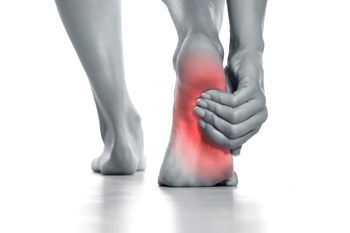
Foot pain can stem from a variety of causes, affecting daily activities and overall quality of life. Diseases such as arthritis and diabetes can lead to inflammation and nerve damage, resulting in chronic discomfort. Deformities like bunions or hammertoes change the structure of the foot, often causing pain during movement. Biomechanical conditions, including flat feet or high arches, can disrupt weight distribution and lead to strain on the muscles and ligaments. Additionally, wearing improper footwear is a significant contributor to foot pain, and shoes that lack support or fit poorly can worsen existing issues. Injuries from sports, falls, or accidents can also cause acute pain, impacting mobility. Any type of foot pain can cause difficulty in completing daily activities. If you have developed foot pain, it is suggested that you contact a podiatrist who can provide an accurate diagnosis and treatment.
Foot Pain
Foot pain can be extremely painful and debilitating. If you have a foot pain, consult with Dr. Robert Hope from Riverside Podiatry. Our doctor will assess your condition and provide you with quality foot and ankle treatment.
Causes
Foot pain is a very broad condition that could be caused by one or more ailments. The most common include:
Diagnosis
To figure out the cause of foot pain, podiatrists utilize several different methods. This can range from simple visual inspections and sensation tests to X-rays and MRI scans. Prior medical history, family medical history, and any recent physical traumatic events will all be taken into consideration for a proper diagnosis.
Treatment
Treatment depends upon the cause of the foot pain. Whether it is resting, staying off the foot, or having surgery; podiatrists have a number of treatment options available for foot pain.
If you have any questions, please feel free to contact our office located in Tuscaloosa, and Fayette, AL . We offer the newest diagnostic and treatment technologies for all your foot care needs.
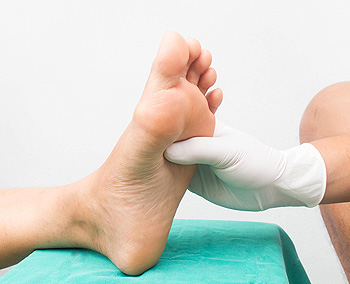
Diabetic neuropathy occurs when high blood sugar levels damage the nerves in the feet, leading to symptoms such as numbness, tingling, and burning sensations. A podiatrist can diagnose diabetic neuropathy through various tests. Included are checking the response of your feet to temperature, touch, and reflexes to assess nerve function. Although nerve damage cannot be reversed, a podiatrist can help reduce the risk of complications by recommending regular foot inspections, managing foot ulcers promptly, and ensuring proper foot hygiene. Choosing the right footwear and inspecting shoes for potential hazards are also key steps in preventing further complications. Regular visits to a podiatrist can help monitor foot health and provide proper treatment should infections or deformities arise. If you have diabetic neuropathy that affects your feet, it is suggested that you make a podiatrist a part of your medical team to manage this condition.
Neuropathy
Neuropathy can be a potentially serious condition, especially if it is left undiagnosed. If you have any concerns that you may be experiencing nerve loss in your feet, consult with Dr. Robert Hope from Riverside Podiatry. Our doctor will assess your condition and provide you with quality foot and ankle treatment for neuropathy.
What Is Neuropathy?
Neuropathy is a condition that leads to damage to the nerves in the body. Peripheral neuropathy, or neuropathy that affects your peripheral nervous system, usually occurs in the feet. Neuropathy can be triggered by a number of different causes. Such causes include diabetes, infections, cancers, disorders, and toxic substances.
Symptoms of Neuropathy Include:
Those with diabetes are at serious risk due to being unable to feel an ulcer on their feet. Diabetics usually also suffer from poor blood circulation. This can lead to the wound not healing, infections occurring, and the limb may have to be amputated.
Treatment
To treat neuropathy in the foot, podiatrists will first diagnose the cause of the neuropathy. Figuring out the underlying cause of the neuropathy will allow the podiatrist to prescribe the best treatment, whether it be caused by diabetes, toxic substance exposure, infection, etc. If the nerve has not died, then it’s possible that sensation may be able to return to the foot.
Pain medication may be issued for pain. Electrical nerve stimulation can be used to stimulate nerves. If the neuropathy is caused from pressure on the nerves, then surgery may be necessary.
If you have any questions, please feel free to contact our office located in Tuscaloosa, and Fayette, AL . We offer the newest diagnostic and treatment technologies for all your foot care needs.
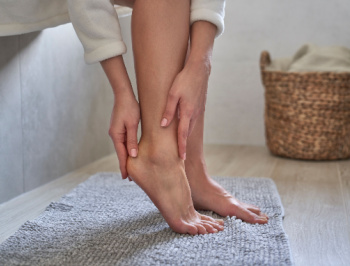
Maintaining a consistent foot care routine is vital for overall foot health and can prevent common issues such as infections and discomfort. Start by washing your feet daily with mild soap and warm water, including between the toes. After washing, dry your feet thoroughly to prevent moisture buildup. Regularly moisturize the skin, focusing on the heels and any dry areas, but avoid the spaces between the toes to prevent fungal growth. Check your toenails frequently, trimming them straight across to avoid ingrown nails. Wearing breathable shoes and changing socks daily can also help keep feet dry and healthy. Lastly, consider giving your feet a break with gentle stretches and massages to improve circulation. If you have developed foot conditions from lack of practicing a regular foot care routine, it is suggested that you contact a podiatrist who can treat various foot ailments and advise you on a foot care routine that is right for you.
Everyday foot care is very important to prevent infection and other foot ailments. If you need your feet checked, contact Dr. Robert Hope from Riverside Podiatry. Our doctor can provide the care you need to keep you pain-free and on your feet.
Everyday Foot Care
Often, people take care of their bodies, face and hair more so than they do for their feet. But the feet are a very important aspect of our bodies, and one that we should pay more attention to. Without our feet, we would not be able to perform most daily tasks.
It is best to check your feet regularly to make sure there are no new bruises or cuts that you may not have noticed before. For dry feet, moisturizer can easily be a remedy and can be applied as often as necessary to the affected areas. Wearing shoes that fit well can also help you maintain good foot health, as well as making it easier to walk and do daily activities without the stress or pain of ill-fitting shoes, high heels, or even flip flops. Wearing clean socks with closed shoes is important to ensure that sweat and bacteria do not accumulate within the shoe. Clean socks help to prevent Athlete’s foot, fungi problems, bad odors, and can absorb sweat.
If you have any questions please feel free to contact our office located in Tuscaloosa, and Fayette, AL . We offer the newest diagnostic and treatment technologies for all your foot and ankle needs.
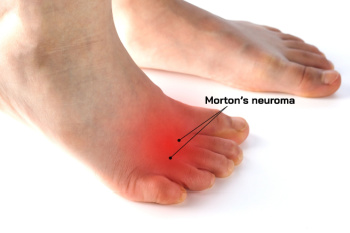
Morton's neuroma affects the foot, specifically involving a thickening of the tissue that surrounds a nerve leading to the toes. It is often found between the third and fourth metatarsals. This condition typically causes significant discomfort, resulting in a sharp, burning pain in the ball of the foot. Individuals may also experience tingling or numbness in the toes, which can feel like there is a pebble in the shoe. Symptoms often worsen during activities that put pressure on the forefoot, such as wearing tight shoes or high heels. Swelling may also occur, further complicating the discomfort. Recognizing these symptoms early is essential for effective management and relief. If you suspect you have Morton's neuroma, it is suggested that you seek medical advice from a podiatrist who can make a proper diagnosis and help you explore treatment options.
A plantar fibroma may disrupt your daily activities. If you have any concerns, contact Dr. Robert Hope of Riverside Podiatry. Our doctor can provide the care you need to keep you pain-free and on your feet.
Plantar Fibroma
A plantar fibroma is a fibrous knot in the arch of the foot. It is embedded in the plantar fascia which is a band of tissue that extends from the heel to the toes along the bottom of the foot. There can be multiple plantar fibromas in the feet at the same time. There are no known causes for this condition. If you have a plantar fibroma, there will be a bump in the arch of your foot that cannot be missed. Any associated pain is most often due to a shoe rubbing against the nodule. Non-surgical options, such as steroid injections, physical therapy, and orthotics should be tried first. Surgery is a last resort and is the only thing that will remove a plantar fibroma entirely. Consult with a podiatrist for a proper diagnosis and to determine the treatment regimen that is right for you.
What Causes a Plantar Fibroma?
While there are no specific causes identified, a plantar fibroma can possibly come from genetic predisposition or the formation of scar tissue that forms from healing the tears in the plantar fascia.
What Are the Symptoms of a Plantar Fibroma?
There will be a noticeable lump in the arch of the foot that may or may not cause pain. If pain is felt, it is typically because a shoe is rubbing up against the lump or when walking or standing barefoot.
Treatment and Prevention
A plantar fibroma will not disappear without treatment, but it can get smaller and be a non-issue. If pain persists, a podiatrist examines the foot and when the arch of the foot is pressed, pain can be felt down to the toes. An MRI or biopsy might be performed to help diagnose or evaluate the plantar fibroma. The following non-surgical options are generally enough to reduce the size and pain of these nodules:
Surgery is considered if the mass increases in size and the patient continues to feel pain after non-surgical methods are tried.
If you have any questions please feel free to contact our office located in Tuscaloosa, and Fayette, AL . We offer the newest diagnostic tools and technology to treat your foot and ankle needs.
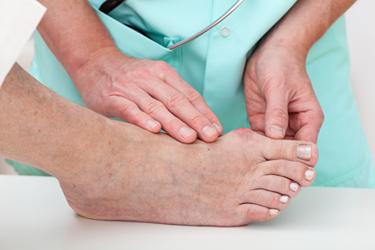
Bunions, a bony bump at the base of your big toe, can result from a misalignment of bones and tissues that pushes the toe inward. While surgery is the only way to completely remove a bunion, nonsurgical bunion treatments can effectively manage symptoms and slow progression. Wearing shoes with a wide toe box and low heels can reduce pressure on the bunion. Custom orthotics can help with proper foot alignment. Toe spacers and splints can also relieve discomfort by preventing further misalignment, although they will not permanently correct the bone structure. Stretching exercises may increase flexibility and ease pain, but they will not reverse the bunion itself. If your bunion is causing discomfort, consulting a podiatrist early can lead to treatment options that delay or prevent further complications. If you have pain caused by a bunion, it is suggested that you schedule an appointment with a podiatrist for guidance.
If you are suffering from bunion pain, contact Dr. Robert Hope of Riverside Podiatry. Our doctor can provide the care you need to keep you pain-free and on your feet.
What Is a Bunion?
Bunions are painful bony bumps that usually develop on the inside of the foot at the joint of the big toe. As the deformity increases over time, it may become painful to walk and wear shoes. Women are more likely to exacerbate existing bunions since they often wear tight, narrow shoes that shift their toes together. Bunion pain can be relieved by wearing wider shoes with enough room for the toes.
Causes
Symptoms
In order to diagnose your bunion, your podiatrist may ask about your medical history, symptoms, and general health. Your doctor might also order an x-ray to take a closer look at your feet. Nonsurgical treatment options include orthotics, padding, icing, changes in footwear, and medication. If nonsurgical treatments don’t alleviate your bunion pain, surgery may be necessary.
If you have any questions, please feel free to contact our office located in Tuscaloosa, and Fayette, AL . We offer the newest diagnostic and treatment technologies for all your foot care needs.